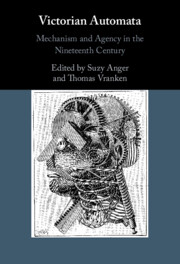An Afterthought on Victorian Automata as Afterthought (and Signifier)
Published online by Cambridge University Press: 15 March 2024
Summary
This volume considers the meanings of automatism and automata for Victorian culture. In the nineteenth century, theories of automatism became central to scientific and popular understandings of human thought and action. Engineers made the first attempts at constructing mechanisms that replicated the intelligence of human beings. Mechanical automata charmed crowds. Black and Asian automata became popular commodities. This collection brings together essays by scholars of the history of science, literature, theatre, and media, which explore the widespread cultural interest in mechanical automata and conceptions of automatism in the period. The essays examine social, technological, scientific, philosophical, and aesthetic developments that automata and their representation generated. They look at the conceptions of legal responsibility, volition, and creativity that theories of automatism produced, and show how automata and automatism were recruited in constructions of race. The essays examine automata and automatism in literary texts. They demonstrate that Victorian thought on automata and automatism continues to have resonance for current understandings of mind, agency, mechanism, and artificial intelligence.
Keywords
- Type
- Chapter
- Information
- Victorian AutomataMechanism and Agency in the Nineteenth Century, pp. 26 - 30Publisher: Cambridge University PressPrint publication year: 2024



